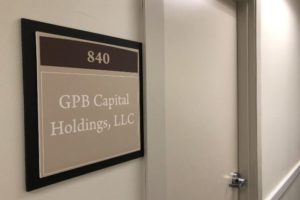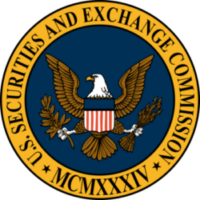Business Development Companies (“BDCs), Non-traded Real Estate Investment Trusts (“REITs), and most other alternative or direct investments are illiquid investments, not listed on public exchanges and with little to no secondary market trading.
 In February 2021, GPB Automotive Portfolio, LP, was found to be a massive $1.8 billion Ponzi Scheme. Securities and Exchange Commission v. GPB Capital Holdings, LLC, Case 1:21-cv-00583 (February 2, 2021).
In February 2021, GPB Automotive Portfolio, LP, was found to be a massive $1.8 billion Ponzi Scheme. Securities and Exchange Commission v. GPB Capital Holdings, LLC, Case 1:21-cv-00583 (February 2, 2021).
In November 2018, GPB Capital’s accountant, Crowe LLP, resigned purportedly based on its determination that its internal risk-tolerance parameters were exceeded by the activity reflected in GPB Capital’s books and records, and in February 2019, the FBI raided the offices of GPB Capital. On February 4, 2021, three individuals affiliated with GPB Capital Holdings, were indicted on five counts of securities fraud, wire fraud and conspiracy.
According to the indictment, the Defendants engaged in a Ponzi-like scheme by using investor funds to pay distributions back to investors. United States v. Gentile, et al., Docket No. 21-CR-54 (DG)(E.D.N.Y. Feb. 2, 2021). It was also disclosed that GPB paid broker-dealers selling these securities more than $187 million in selling fees.
 It was also disclosed that at the time of sale, GPB Automotive Portfolio, L.P. was not registered with the SEC. From inception, through April 2017, these securities were marketed and sold pursuant to Regulation D of the Securities Act of 1933, 17 C.F.R. § 230.500 et seq.
It was also disclosed that at the time of sale, GPB Automotive Portfolio, L.P. was not registered with the SEC. From inception, through April 2017, these securities were marketed and sold pursuant to Regulation D of the Securities Act of 1933, 17 C.F.R. § 230.500 et seq.
On December 7, 2023, “the U.S. District Court for the Eastern District of New York granted the SEC’s request to convert the ongoing monitorship over GPB Capital Holdings, LLC (“GPB Capital”) and multiple affiliated entities into a receivership.”
“According to the SEC’s complaint, David Gentile, the owner and CEO of GPB Capital, and Jeffry Schneider, the owner of GPB Capital’s placement agent Ascendant Capital, lied to investors about the source of money used to make an annualized distribution payment to investors. Investors were allegedly told that the distribution payments were paid exclusively with monies generated by GPB Capital’s portfolio companies, but GPB Capital actually used investor money to pay portions of the annualized distribution payments. To perpetuate the deception, GPB Capital allegedly manipulated the financial statements to give the false appearance that the funds’ income was closer to generating sufficient income to cover the distribution payments than it actually was. GPB Capital also allegedly violated the whistleblower provisions of the securities laws by including language in termination and separation agreements that impeded individuals from coming forward to the SEC, and by retaliating against a known whistleblower.”
“The SEC’s complaint, filed in federal court for the Eastern District of New York, charged Gentile, Schneider, GPB Capital, Ascendant Alternative Strategies, and Ascendant Capital with violating the antifraud provisions of the Securities Act of 1933 and the Securities Exchange Act of 1934 (“Exchange Act”), and Jeffrey Lash with aiding and abetting certain of those violations. The complaint also charged GPB Capital and Gentile with violating the antifraud provisions of the Investment Advisers Act of 1940 (“Advisers Act”) and charged GPB Capital with violating the registration and whistleblower provisions of the Exchange Act and the Advisers Act’s custody and compliance rules. The complaint sought disgorgement of ill-gotten gains plus prejudgment interest and penalties.”
On February 12, 2021, the Court appointed a monitor, Joseph T. Gardemal III, to oversee GPB Capital. On June 13, 2022, the SEC moved to convert the monitorship into a receivership because of GPB’s alleged breach of the monitor order. On June 7, 2023, the Court entered a partial judgment against Lash by consent in which he agreed to be permanently enjoined from violations of the charged provisions. On December 7, 2023, the Court granted the SEC’s motion, and on December 8, 2023, the Court appointed Mr. Gardemal as receiver over GPB Capital and numerous affiliated entities. Pursuant to the terms of the order, within 45 days, the receiver shall provide the Court an accounting of receivership assets and propose a plan to distribute assets to investors.
At the time of sale to most retail investors, there was limited disclosure with respect to the company and its business activities. Yet, many stockbroker and investment professionals, ostensibly because of the compensation associated with the sale of these securities, exclusive of due diligence fees and marketing expenses, sold these securities anyway.
Litigation Release No. 25909 (December 12, 2023)(Securities and Exchange Commission v. GPB Capital Holdings, LLC et al., Civil Action No. 21-cv-583 (E.D.N.Y. filed February 4, 2021).
 As the US Securities & Exchange Commission, in its approval of the consolidated FINRA Suitability Rule observed:
As the US Securities & Exchange Commission, in its approval of the consolidated FINRA Suitability Rule observed:
Reasonable-basis suitability requires a broker to have a reasonable basis to believe, based on reasonable diligence, that the recommendation is suitable for at least some investors.
In general, what constitutes reasonable diligence will vary depending on, among other things, the complexity of and risks associated with the security or investment strategy and the firm’s or associated person’s familiarity with the security or investment strategy.
A firm’s or associated person’s reasonable diligence must provide the firm or associated person with an understanding of the potential risks and rewards associated with the recommended security or strategy.
See Securities Exchange Act Release No. 63325 (November 17, 2010).
Any meaningful due diligence with respect to the information that was available, it was disclosed that:
a) GPB was not a conservative investment, but instead presented a high degree of risk;
b) that the stated 8% yield was not income, but a distribution of principal;
c) those distributions were paid out of working capital which could include investor contributions or funds flowing from new investors;
d) the company was highly leveraged, and its continuing financial viability was dependent on its ability to continue raise capital;
e) approximately 20 percent or more of the $1.8 billion raised by GPB was used to pay for marketing and commissions, including “due dilligence” fees paid to the underwriters, and retail brokers selling GPB to their customers;
f) Officers and directors of GPB were utilizing investor funds to monetize personal business interests by selling these interests to the company at inflated prices.
 In any event, as of May 2017, GPB Automotive had more than 2,000 limited partners and assets in excess of $10 million. As a result, Regulation 12g-1 under the Securities Exchange Act of 1934 required each Fund to register its securities with the SEC and to file an audited financial statement by April 30, 2018. As set forth above, in November 2018, GPB Capital’s accountant, Crowe LLP, resigned and in February 2019, the FBI raided GPB’s offices.
In any event, as of May 2017, GPB Automotive had more than 2,000 limited partners and assets in excess of $10 million. As a result, Regulation 12g-1 under the Securities Exchange Act of 1934 required each Fund to register its securities with the SEC and to file an audited financial statement by April 30, 2018. As set forth above, in November 2018, GPB Capital’s accountant, Crowe LLP, resigned and in February 2019, the FBI raided GPB’s offices.
In connection with the sale of GPB Automotive, stockbrokers and their firms realized as much as 13% in commissions and due diligence fees.
As of even date, a Trustee has been appointed. Third party auctions suggest that these securities may be substantially worthless. Investors in GPB Automotive, and its related companies, including GPB Holdings I or GPB Holdings II, should consult with qualified counsel to determine their legal rights.
Guiliano Law Group
Our practice is limited to the representation of investors. We accept representation on a contingent fee basis, meaning there is no cost to you unless we make a recovery for you. There is never any charge for a consultation or an evaluation of your claim. For more information, contact us at (877) SEC-ATTY.
For more information concerning common claims against stockbrokers and investment professionals, please visit us at securitiesarbitrations.com
CONTACT US FOR A FREE CONSULTATION
